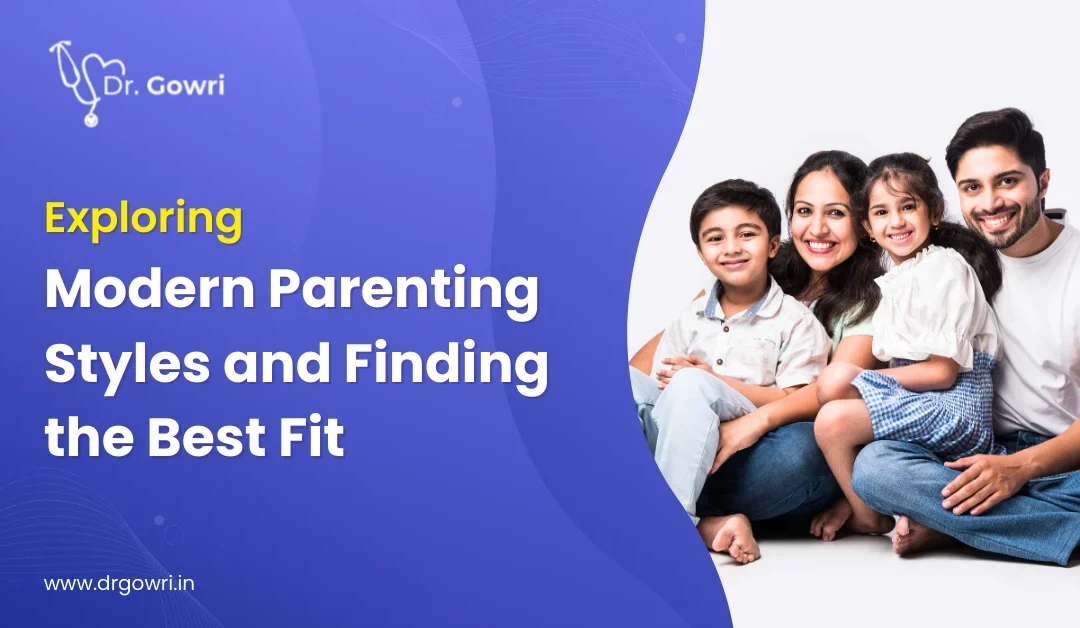“Don’t worry that children never listen to you: worry that they are always watching you.”
-Robert Fulghum
Parenting is a lifelong journey filled with love, challenges, and learning. It involves guiding, nurturing, and supporting a child’s growth while balancing discipline, empathy, and independence. Parenting in today’s modern world comes with its own unique set of challenges. With evolving societal norms, technological advancements, and shifting family dynamics, the approach to raising children has changed in diverse ways. No single approach can fit in all families, and adapting to a child’s unique needs becomes important.
So let us delve into some modern approaches to parenting!
Authoritative Parenting: The Balanced Approach
This approach combines the best of both worlds. It’s an assertive yet responsive parenting style that will have parents set clear expectations while also showing warmth and support. Authoritative parents provide structure, but they also value their child’s opinions and feelings. Research suggests that children raised with this style tend to develop confidence, self-discipline, and strong social skills.
Pros:
- Research suggests that children raised with authoritative parenting are often well-adjusted and perform well academically and socially.
- Encourages independence while maintaining a nurturing environment.
Cons:
- It requires a lot of communication and patience, which can be challenging for busy parents.
- If not balanced right, it might teeter towards being too permissive or too strict.
Helicopter Parenting: The Overprotective Guardian
These parents are particularly protective, constantly coming in to protect their kids from any harm or unhappiness. Helicopter parents prefer to take charge of all aspects of the child’s life, from classwork to buddies. While this ensures safety and high achievement, it can hinder children’s ability to make independent decisions.
Pros:
- Kids often feel secure knowing their parents are deeply involved in their lives.
- They may excel academically with extra support and guidance.
Cons:
- Kids may struggle with independence and decision-making skills.
- The nagging and control can lead to stress for both the parent and the child.
Free-Range Parenting: Raising Independent Thinkers
Free-range parenting allows children to explore the world with minimal parental intervention. It emphasizes independence and problem-solving skills. Advocates of this approach believe that children benefit from developing independence and learning critical life skills.
Pros:
- Encourages independence and self-reliance.
- Kids often learn valuable problem-solving skills by navigating challenges on their own.
Cons:
- Safety concerns can arise, especially in urban settings.
- Not all parents feel comfortable with the level of freedom that free-range parenting promotes.
Attachment Parenting: The Nurturing Caregiver
Attachment parenting focuses on building a strong emotional bond between parent and child, often through practices like co-sleeping, extended breastfeeding, and baby-wearing. The goal is to foster secure attachments, which can lead to emotionally resilient children. However, it requires immense time and patience.
Pros:
- This style often leads to strong emotional connections and secure attachment.
- Parents may have a better understanding of their child’s needs.
Cons:
- It can be exhausting and may not work for every family dynamic.
- Some critics argue it can create dependency rather than independence.
Gentle Parenting: Raising Emotionally Secure Kids
This approach focuses on respect, empathy, and understanding. Instead of using punishments or harsh discipline, gentle parents focus on setting boundaries while nurturing their children’s emotional well-being.
Pros:
- It promotes emotional intelligence and healthy communication.
- Kids learn to express their feelings and navigate relationships more successfully.
Cons:
- Some parents may find it challenging to implement discipline without traditional methods.
- Parents need to be very self-aware and emotionally mature to handle potential conflicts effectively.
Positive Parenting: Raising Happy and Confident Kids
This parenting approach emphasizes positive reinforcement, not punishment. By rewarding positive behavior and maintaining open lines of communication, this type of parenting attempts to give a child a strong sense of self-worth and foster a strong parent-child bond.
Pros:
- Encourages a healthy family environment and reduces conflict.
- Children are likely to feel empowered and respected.
Cons:
- It is hard to be positive and supportive in times of stress and therefore can be unpredictable.
- Parents can also struggle to find the balance between independence and guidance.
So, what’s the Best Parenting Style?
There’s no definitive answer because every child and family dynamic is unique. What matters is finding a balance that works for you and your family. Every child is unique, with their own set of needs, and what works for one may not work for another. Many modern parents find that they naturally blend different styles based on their child’s personality, their values, and their family’s conditions.
Final Thoughts..,
Parenting is a journey, not a destination. The key is to remain adaptable, patient, and loving. Yes! it is messy and complicated, yet it’s hugely rewarding. Laugh at the mistakes, find joy in the small victories, and enjoy that special bond between you and your child.
About the Author

Dr. Gowri Ravi Chinthalapalli is a Developmental and Family Physician with over 16 years of experience in child development and family medicine. She has treated more than 50,000 patients worldwide. After completing her MBBS from Rajiv Gandhi University of Health Sciences, she pursued MRCGP from the UK and gained wide experience in primary care and emergency medicine. She also holds a Fellowship in Child Development from the Centre for Child Development and Disabilities, Bengaluru. Dr. Gowri currently practices at Aster CMI Hospital and Canara Diagnostic Centre, Bengaluru. She is passionate about guiding families, supporting children with developmental needs, and providing holistic care.

